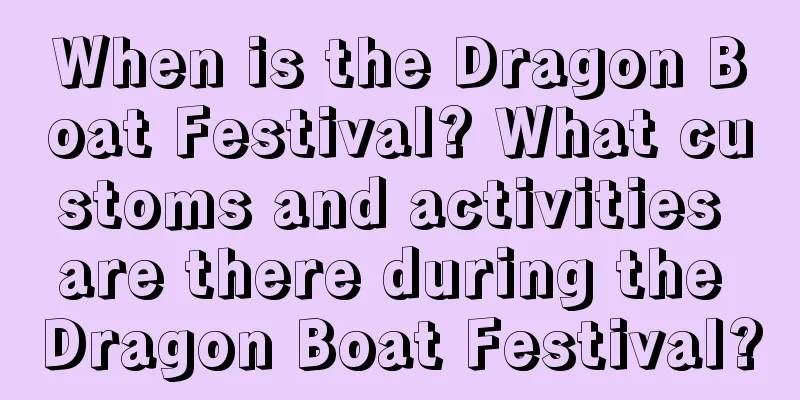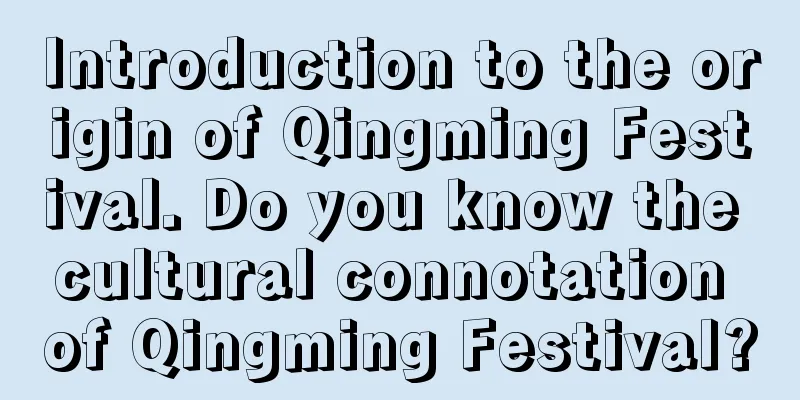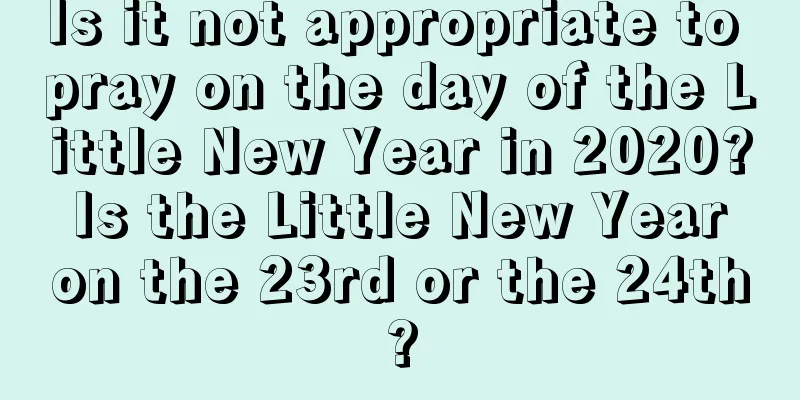When is the Dragon Boat Festival? What customs and activities are there during the Dragon Boat Festival?

The Dragon Boat Festival is one of the traditional festivals, but not everyone knows when it is. So, let’s take a look at what day the Dragon Boat Festival is. What customs and activities are there during the Dragon Boat Festival? The Book of Songs records that “cicadas chirp in May”, and cicadas are the same as crickets. This means that in May cicadas break through the soil and climb up the trees, starting the first clear singing of summer, so May is also known as "Ming Cicada". Click on Shui Mo Network to learn about the relevant content in May.When is the Dragon Boat Festival?The Dragon Boat Festival falls on the fifth day of the fifth month of the lunar calendar every year. The lunar calendar time of the Dragon Boat Festival is fixed, but the solar calendar time is different every year.The Dragon Boat Festival, also known as the Duanyang Festival, Dragon Boat Festival, Double Fifth Festival, Tianzhong Festival, etc., is a major folk festival that combines worshiping gods and ancestors, praying for blessings and warding off evil spirits, celebrating, entertaining, and eating. The Dragon Boat Festival originated from the worship of natural celestial phenomena and evolved from the dragon sacrifice in ancient times. During the Dragon Boat Festival in midsummer, the Blue Dragon soars to the center of the south, the most "central" position of the year, just as the fifth line of the Qian Gua in the Book of Changes says: "A flying dragon in the sky." The Dragon Boat Festival is an auspicious day with "flying dragons in the sky". The dragon and dragon boat culture have always been present in the history of the Dragon Boat Festival. What customs and activities are there during the Dragon Boat Festival?Custom activity 1: Dragon boat racingThe ancient Yue people took the dragon as their totem. In order to show that they were of the "dragon race", they not only had the custom of cutting their hair and tattooing themselves, but also held a grand totem festival on the fifth day of the fifth lunar month every year. Custom activity 2: Hanging mugwort and calamus The tradition of arranging various flowers and plants to ward off evil spirits and cure diseases during the Dragon Boat Festival is also very old. People regard inserting mugwort and calamus as an important part of the Dragon Boat Festival. Custom activity three: eating zongzi during Dragon Boat Festival Zongzi, also known as "zongzang", is commonly known as zongzi. The main ingredients are glutinous rice and fillings. It is wrapped in reed leaves (or hollyhock leaves) and has various shapes, including pointed and square. Zongzi has a long history and was originally used as an offering to ancestor gods. Custom activity 4: Flying kites A kite is a flying device that uses only aerodynamics and is made by pasting paper or silk on a bamboo frame and then flying into the sky by pulling a long string tied to the string. In southern China, children flying kites on the Dragon Boat Festival is called "releasing disasters." Custom activity 5: Washing with herbal water Herbal water is the Mulan Soup recorded in ancient books. Washing with herbal water on the Dragon Boat Festival can cure skin diseases and remove evil spirits. Custom activity six: tying five-colored silk threads In traditional Chinese culture, the five colors of "blue, red, white, black and yellow" that symbolize the five directions and five elements are regarded as auspicious colors. Tying five-colored silk threads on arms was once a popular custom during the Dragon Boat Festival. Custom activity seven: Fetching water at noon Noon water refers to the water drawn from the well at noon on the Dragon Boat Festival. "Drawing water at noon" during the Dragon Boat Festival is a traditional custom prevalent in the coastal areas of southern China. Custom activity 8: Wearing bean-flowers In the old days, women’s headdresses during the Dragon Boat Festival were mostly seen in the south of the Yangtze River. In some areas, they are also called Jianren. Some say this object originated from the ancient buyao, while others say it is a different form of mugwort man. Customs and Activities 9: Pasting the Noon Talisman In the old days, there was a custom of posting "noon talismans" in some places in Guangdong. After lunch, every family puts up a "noon talisman". Customs and Activities 10: Worshipping Gods and Ancestors Worshiping gods and ancestors is one of the important customs of the Dragon Boat Festival. "Heaven and earth are the basis of life; ancestors are the basis of mankind." Heaven and earth are the basis of life, and ancestors are the basis of mankind. Ancestor worship is a custom that passes on filial piety, and through sacrifice, we pray and repay their protection and blessings. |
<<: What is the lunar calendar for March 21, 2022? Can we start work?
>>: Is it a good time to get married on Xiaoman Day in 2022? Can we have a wedding?
Recommend
A complete analysis of the fate of friends born on Qingming Festival under the zodiac sign of Pig
The zodiac pig is one of the twelve zodiac signs. ...
What’s the right name for a boy born on the tenth day of the Lunar New Year in 2021? Cool name recommendation
The arrival of the first month of the lunar calend...
Is June 21, 2020 an auspicious day? Is it suitable for opening a store?
The sixth month in the lunar calendar is the firs...
What are the taboos in the seventh month of the lunar calendar? Analysis of the taboos in the seventh month of the lunar calendar!
Introduction: The seventh month of the lunar calen...
Can I go to the temple to pray during the Qingming Festival in 2020? What should I pay attention to when praying during the Qingming Festival?
Introduction: Sometimes you need to choose an ausp...
Is it possible to get married on the sixth day of the first lunar month in 2019? What does it mean that you can’t get married in the first month of the lunar year?
Is it possible to get married on the sixth day of ...
Is it a good idea to get married on the first day of the eighth lunar month in 2019? Is it a good day?
Marriage is a major event in life, and choosing a...
New Year’s Eve customs: Why do we keep the lights on on New Year’s Eve? Any comment?
Introduction: New Year's Eve is an important t...
What is the fate of those born at the Zi hour during the White Dew solar term in 2019?
Zi hour is the beginning of the day, which is from...
Is it suitable to set up a bed on the 18th day of the fourth lunar month in 2018, Children’s Day?
Introduction: Beds are important to people, and wh...
Can a Xindian company open for business on February 19, 2020, the Year of the Rat?
According to the lunar calendar, we can analyze w...
Query the location of the God of Wealth on the 27th day of the third lunar month in 2018
The Fortune Teller website has carefully compiled...
Is it appropriate to open a store on December 13th, 2017?
Most traditional festivals are concentrated in th...
Is it auspicious or inauspicious to move house during the Frost Descent in 2019? Analysis of the auspiciousness and inauspiciousness of the Frost Descent!
Moving is a big deal, so you should choose an ausp...
Is it a good time to pray on the eighth day of the third lunar month in 2021? What is the hexagram?
The third month of the lunar calendar is the month...









